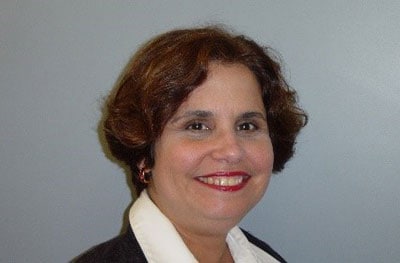Real Stories from People Living with Sickle Cell Disease: Dr. Alvarez
Physician Perspective - Dr. Alvarez’s Story

“When I have patients, I tell them that people with sickle cell trait (SCT) can have a normal lifespan and that the great majority of people will not have problems. But, occasionally, there are problems. Blood in the urine can happen from kidney damage, or in rare cases, it can be caused by a tumor,” says Dr. Ofelia Alvarez, a pediatric hematologist and professor of clinical pediatrics at the University of Miami’s Miller School of Medicine.
Dr. Alvarez directs the University’s Sickle Cell Program and leads the Newborn Screening Program for hemoglobinopathies in Miami-Dade and Monroe Counties in Florida. Dr. Alvarez primarily provides care for patients with sickle cell disease (SCD) but sometimes will see patients with SCT.
People with SCD are born with two sickle cell genes, but people with SCT are born with one normal gene and one sickle cell gene. The great majority of people with SCT will not experience pain crises or other symptoms of SCD. However, in very extreme conditions, such as in high altitudes or when dehydrated, people with SCT can experience shortness of breath, pain crises, and other health problems related to SCD. In very few cases, SCT and SCD have been linked to a rare kidney cancer known as renal medullary carcinoma (RMC). Most reported cases of RMC have occurred in people with SCT, but very rarely, cases of RMC have also been reported in people with SCD.
In 2014, Dr. Alvarez became interested in learning more about RMC and SCT. RMC arises from the lining of the inside of the kidney. “If you think about a kidney as a bean shape with a stem coming out, the tumor will form around the inside of the stem,” says Dr. Alvarez. RMC is an extremely rare and aggressive type of cancer, and information on RMC is still limited. Researchers have found that most reported cases of RMC occur in young black adults living with SCT, but researchers do not yet know why some people with SCT will develop RMC and why some people with SCT may not.
Researchers and clinicians are working to learn more about the link between RMC and SCT through research and clinical trials, but it’s been challenging because the cancer is very rare. Although some progress has been made, there is still a lot to learn about RMC and SCT. More research and knowledge on the cancer can help inform best methods to treat it and hopefully find ways to prevent this rare but serious cancer. “Clinical trials are important. Clinical trials of therapies for RMC will not only provide more knowledge about the disease but can also benefit patients by showing us what works and what doesn’t work so that we can offer better treatment options moving forward,” says Dr. Alvarez.
In addition to research, Dr. Alvarez stresses the importance of raising awareness of RMC and its link to SCT. “We know it’s a very aggressive tumor. It has a high fatality (death) rate, and one problem is that over 90 percent of patients present with the cancer in its late, advanced stage,” says Dr. Alvarez. “Patients have better outcomes when the tumor is found in its early stages.”
Awareness of RMC and SCT can help people to know to seek medical attention if they notice symptoms of RMC, such as blood in the urine or abdominal pain. “Unfortunately, because RMC is very rare, screenings are not recommended. Awareness is the focus. When people come to me with SCT, I always tell them that if they have bloody urine then they should seek medical advice. Not all bloody urine from someone with SCT or SCD means there is cancer, but they should still seek medical advice. That’s something we, as clinicians, need to communicate to people,” says Dr. Alvarez.
Learn more about SCT, and access CDC’s SCT Toolkit for more information.
Seek additional resources and support:
- RMCSupport.org
- Read Ritchie Johnson’s personal story about her son, Chris’ battle with RMC, and visit the org founded in honor of Chris.
- Read Dr. Alvarez’s paper on RMC. For questions about RMC and SCT, you can reach Dr. Alvarez at oalvarez2@med.miami.edu
CDC thanks Dr. Ofelia Alvarez for sharing her story.
